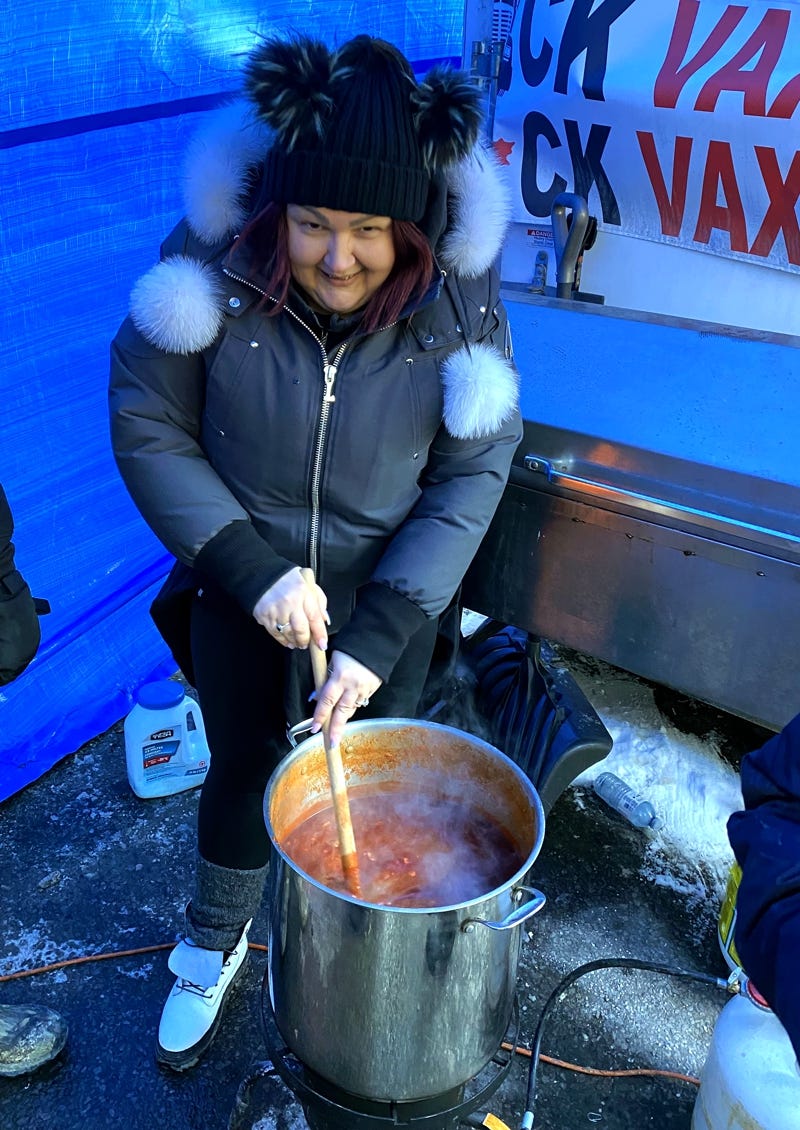It Was So Cold (2 of 7)
Nevertheless, 'It just felt amazing. Right away, we knew this was gonna be something.'
Part 1: Grave Financial Peril

Through their church, O'Jay and Ivana secured vaccine exemptions on religious grounds. "I'd normally cross the border at Windsor or Sarnia," he explains. "I never had much of an issue going to the States." It was Canadian border guards, on his way back, who were the problem. On one occasion, they threatened to arrest him over his lack of a face mask. In the run-up to the January 15th vaccine deadline, he says, "I had the certificate, everything numbered. I would ask them, and I would show them. And they said they had no authority to authorize it."
At one point, he considered taking the vaccine against his better judgment. He was making good money, and at least they'd have one income. "I'm like, 'OK, I'll do it, and everybody else can stay home.'" He looks over at Ivana, who repeats her reply at the time, "Absolutely not. We'll find a way."
From January 15th onward, O'Jay was unable to work. When they started hearing about the Freedom Convoy soon afterward, she says the news was "like a little light. OK, there's more people than us. Let's go do this, where else would we be?"
Anticipating a weekend-long protest, they packed clothes and food for three days. Ivana's mom looked after the kids. They knew the western Convoy on its way to Ottawa was sizeable, but were uncertain how many southern Ontario trucks might join in. "We thought it was gonna be maybe ten, fifteen trucks," she says.
That Thursday morning, "It was so cold, oh my God," she remembers. "So many children, women. There were stands with washer fluid. It just felt amazing. Right away, we knew this was gonna be something."

O'Jay nods, "When we got to Drumbo [south of Kitchener] it was so packed we ended up driving out," getting underway before the Sarnia and Windsor trucks had even arrived. The next day, as they approached Ottawa, they had mechanical problems. "My truck wasn't doing a regen," he says, "because we were driving so slow. It started clogging up, but I didn't know what the issue was at the time."
Stopped on the side of the highway as the rest of the Convoy continued, they needed to make a decision. Should they just return home? They chose to keep going. The truck got them there but shut down completely a week later.
Pulling into Ottawa around 2:30 on Friday afternoon, O'Jay says, "Initially, it felt like we were welcomed, the police were directing us where to park." There was a shared understanding that one lane would remain open for emergency vehicles. The atmosphere was cooperative, "We thought that's how it was going to continue."
His blue, long nose, old school Peterbilt 389 was the second truck west of Bank Street on Wellington, tight up against the north sidewalk. The first night they were there, an Asian woman came to his window. "She cried and cried, saying 'I don't want Canada to become like China, this is why I came here,'" remembers Ivana. "Very heavy accent. She actually gave him a $50 bill. We were shocked."

Ivana herself immigrated at the age of sixteen. "I'm Serbian, I'm from there. We ended up parking in between five Serbian trucks from Kitchener, people we met in Ottawa. One of their trucks had a little trailer, and they had a whole kitchen in there." She recalls a member of that community "carrying a lamb, a whole lamb that they did on the spit there, and he was so proud. The next day, a guy brought in a box of steaks. Cabbage rolls we had often, because Serbian ladies at the church would make them and bring them in those warmers. Everything was shared. Anybody could walk up." Homeless people, shuffling past, were offered steak, she says.
"We were fully taken care of. They would just knock. 'Come O'Jay, food is here, come get it.' Or they would bring it to the window. Nothing was lacking. Nothing, nothing." She displays a photo on her mobile phone, "There's me cooking soup. In a big pot, in the truck next door."
Ivana's mother has friends in Ottawa. "We would call them to pick us up. We'd go shower, and come back with clean laundry." Folks who'd driven their own cars from as far away as British Columbia, "would knock on the window. They were staying in hotel rooms. 'Do you guys need a shower? We have this spot and this spot available.' It was crazy because it's their room, they sleep there. 'No, no you go ahead, use whatever you need.' It was just unbelievable." The occupants of a nearby truck, who had a large pitbull with them, also let them shower in their room.
Meanwhile, people were reaching out. Earlier in the pandemic Ivana had chatted with a woman at a local grocery store, mentioning her part-time catering business and a social media profile. "Never seen her in my life before," she says. While they were Ottawa, the same woman "messaged me on Instagram. Here's $200 for a warm shower and a bed. You guys need to sleep at the hotel one night."
next installment: Erased by the CBC






I love this, always encouraging to hear about generous, kind collective action
Heartwarming still! 💙🙏🏼💙